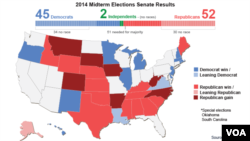President Barack Obama is one of some 316 million Americans who woke up to a radically different political reality after Republicans won control of the Senate from Democrats and strengthened their majority in the House of Representatives in Tuesday's elections.
The president has invited a bipartisan, bicameral group of congressional leaders to the White House on Friday, but most analysts say they are not optimistic that the bitterness and polarization that has paralyzed significant action in Washington for the past several years will change.
It was a joyful night for Republicans and a demoralizing morning after for Democrats, as Republicans rode a strong wave of voter discontent with Obama and anxiety about international threats to make big gains on Capitol Hill and in governors races across the country.
Governors races
In key governors races, Republicans held on to Florida and Wisconsin. Republican House Speaker John Boehner said he was humbled after his party gained at least nine seats in the House.
One of the happiest winners of the night was Republican Senator Mitch McConnell of Kentucky, who will fulfill his long-held dream and become the new Senate majority leader in January after Republicans gained at least seven seats. But even McConnell acknowledged that there is still a divided government in Washington.
"I do not expect the president to wake up tomorrow and view the world any differently than he did this morning. He knows I will not either," McConnell said. "But we do have an obligation to work together on issues where we can agree."
Domestic agenda
Analysts say that Obama will have an even tougher time trying to implement his domestic agenda and that he may have to alter his course. But as election-night euphoria fades, Republicans may also feel the pressure of showing dissatisfied Americans they can get things done ahead of the presidential elections in 2016.
"You know the Republicans obviously had a really good midterm, but they are not going to be in a position to dictate policy because of course President Obama has a say, too, and they do not have veto-proof majorities in either the Senate or the House," said Kyle Kondik, who is with the University of Virginia's Center for Politics.
Obama will lose a valuable and close ally when Democratic Senator Harry Reid has to turn over Senate leadership to McConnell in the new year. McConnell has strongly opposed the president on nearly every issue, and the two men do not have a warm, personal relationship.
But Kondik says they will have to cooperate.
"They do have to live with each other to a certain extent if only to do the bare minimum and make sure that we fulfill our debt obligations and keep the country running," Kondik said.
To keep the government running, Congress will need to approve a spending bill by December 11, the first test of how Tuesday's elections will impact the ability of Congress and the president to govern effectively.







